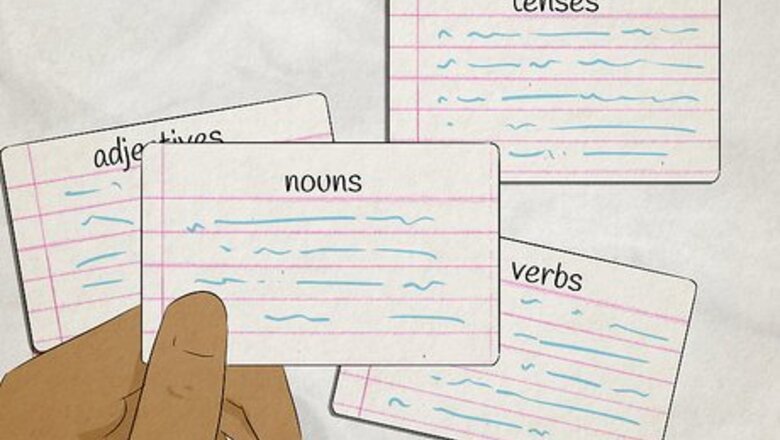
views
Separate the information into chunks.
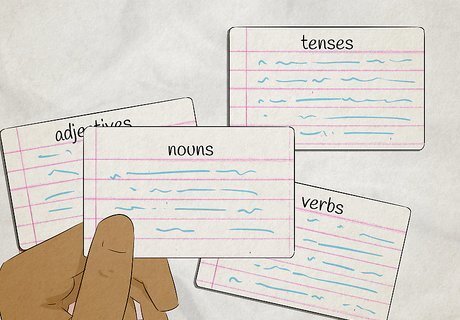
This can help you digest the information faster. For example, if you’re learning a new language, you could break it down into nouns, verbs, adjectives, and tenses. It helps the information feel less overwhelming, and it gives you a path forward on how to study it. If you’re learning from a textbook, it may be organized like this already.
Set small learning goals for yourself.
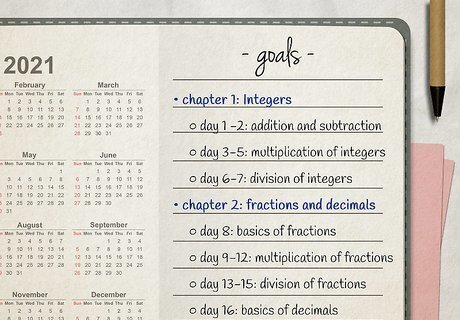
Make your goals specific and time-based to cover the most ground. It will help break up the subject so you aren’t overwhelmed by an entire field of knowledge. You could also set smaller goals throughout the weeks to work up toward learning an entire subject. For example, if you’re studying math, try making it a goal to nail down basic algebra by next week. Then, you can move on to tougher concepts, like calculus. You can also split things up by chapters in a textbook.
Take notes. They will help you remember the subject.

Great notes make studying much easier. Listen to the information being presented and write it down in your own words. Write down key information in short phrases rather than using complete sentences. Leave spaces in your notes to jot down comments or questions later on. For example, instead of writing down, “The food chain is a hierarchical series of organisms each dependent on the next as a source of food,” you could write, “Food chain: series of organisms eating each other.” Try developing a shorthand that’s easy to write down and understand. For example, if you’re learning about chemistry concepts, you could shorten catalyst to cat, chromatography to chrom, or stoichiometry to stoich. If you're taking notes on how to do something sequential, like how to solve a math problem, write your notes down in steps. That way, it will be easier to remember how to apply those same steps to different problems.
Write down notes instead of typing them.

Studies show that writing notes by hand solidifies information in your head. Try going a little old school and whip out a sheet of paper and a pencil. If you want to keep your notes organized, type them up later and save them on your computer. Writing your notes out by hand can take a little longer than typing them up, so it’s important to write in phrases and use shorthand.
Ask questions if you’re feeling stuck.

Getting someone else to explain it can help you learn faster. If there’s a key concept that you just don’t quite get, don’t be afraid to ask. If you’re in a classroom setting, approach the teacher or a fellow classmate. If you’re working on your own, try Googling it or finding an online forum for help. If you’re in higher education, go to your teacher’s office hours to get help throughout the school year. EXPERT TIP Joseph Meyer Joseph Meyer Math Teacher Joseph Meyer is a High School Math Teacher based in Pittsburgh, Pennsylvania. He is an educator at City Charter High School, where he has been teaching for over 7 years. Joseph is also the founder of Sandbox Math, an online learning community dedicated to helping students succeed in Algebra. His site is set apart by its focus on fostering genuine comprehension through step-by-step understanding (instead of just getting the correct final answer), enabling learners to identify and overcome misunderstandings and confidently take on any test they face. He received his MA in Physics from Case Western Reserve University and his BA in Physics from Baldwin Wallace University. Joseph Meyer Joseph Meyer Math Teacher Review basic concepts before diving into advanced topics. Identifying the gaps in your knowledge helps you avoid difficulties later on. Take an assessment or get your teacher's advice on where you can improve. Practice targeted exercises to build a strong foundation so you can confidently tackle new lessons.
Study the subject 10 to 20 minutes a day. Studying will help you learn the subject faster.
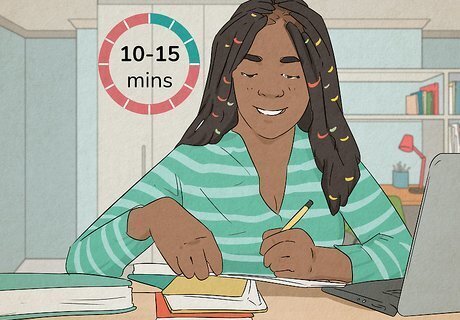
Lengthy cram sessions don't help you retain information in the long-term. Instead, try to space out your study time so you’re doing a little bit every day. Try studying for 10 to 15 minutes every evening or whenever you have time. Studies show that trying to cram a bunch of knowledge into your mind right before a test will only help you retain it in the short term. If you’re limited on time, you might not be able to spread your studying over multiple days. If that’s the case, just make sure you take lots of breaks to give your brain a rest.
Teach the subject to someone else.

Grab a friend or a classmate and pretend you’re a teacher. Go over the basic concepts of what you’re learning, and answer any questions they might have. If you get stuck or struggle at any point, go back and revisit the stuff you’re having trouble with. If you can teach a subject to someone else, you’re probably pretty close to mastering it.
Recite the information out loud.

Read a portion of the material, then say what you just learned. You don’t need to be talking to anyone—you can do this alone in your home if you want. Speaking the information out loud helps you memorize it faster and keep it in your mind for longer. After you’re done, go over the information one more time to make sure you got it right. If you missed anything or struggled in one area, go over it a few more times.
Connect the information to the real world.

What will this knowledge help you do in the future? What is it helping you do right now? Connecting a subject to something you’re doing outside of a classroom setting is a great way to keep your interest peaked. Oftentimes, people connect subjects to what they’re doing career-wise. If you’re learning chemistry, maybe you’ll use it when you work in a lab later on. If you’re studying math, maybe you’ll crunch numbers at an accounting firm in the future.
Memorize information with a mnemonic device.

Use this trick to learn chunks of information quickly. For example, if you want to remember the colors of the rainbow (red, orange, yellow, green, blue, indigo, violet), you could use the mnemonic device Roy G. Biv. It’s much easier to remember, so you can memorize it faster and use it to retain information. If you’re learning the order of operations in math (parentheses, exponents, multiplication, division, addition, subtraction), you could use the mnemonic device PEMDAS.
Test your knowledge with practice tests.
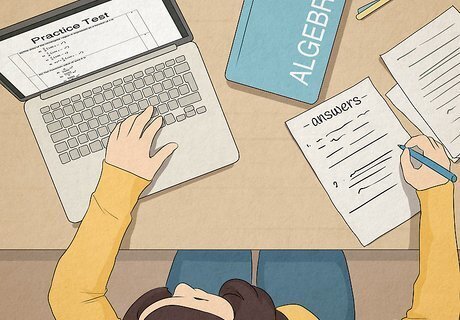
Practice tests can show you where you're struggling. You can find tons of practice tests online for almost any subject. If you’re in a classroom setting, you can also ask your teacher to see if they have ones you could practice with. Make sure you check your answers, and go over anything that you struggled with. You can also ask a fellow classmate to check your answers for you. EXPERT TIP Joseph Meyer Joseph Meyer Math Teacher Joseph Meyer is a High School Math Teacher based in Pittsburgh, Pennsylvania. He is an educator at City Charter High School, where he has been teaching for over 7 years. Joseph is also the founder of Sandbox Math, an online learning community dedicated to helping students succeed in Algebra. His site is set apart by its focus on fostering genuine comprehension through step-by-step understanding (instead of just getting the correct final answer), enabling learners to identify and overcome misunderstandings and confidently take on any test they face. He received his MA in Physics from Case Western Reserve University and his BA in Physics from Baldwin Wallace University. Joseph Meyer Joseph Meyer Math Teacher When doing practice problems, promptly check to see if your answers are correct. Use worksheets that provide answer keys for instant feedback. Discuss answers with a classmate or find explanations online. Immediate feedback will help you correct your mistakes, avoid bad habits, and advance your learning more quickly.




















Comments
0 comment